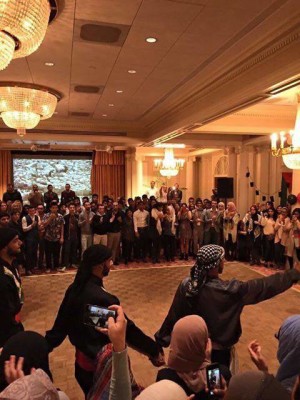
The Metcalf Trustee Ballroom, located on the ninth floor of 1 Silber Way, is adorned with mirrored French doors, glass chandeliers, beautiful wallpaper and a sweeping view of Boston. The ballroom was also decked in the red, green, black and white of the Palestinian flag Friday for the fifth annual Palestinian Cultural Night. Sponsored by Students for Justice in Palestine, the event was open to students and the public alike.
SJP member Sofie Engen, a sophomore in the College of Arts and Sciences, commented on the importance of hosting such an event for the public.
“Everyone has put a lot of work into [Palestinian Cultural Night] to spread the word about issues in Palestine,” she said. “We are a political and cultural group, so it’s a good way to get people involved with SJP through a cultural side of it.”
The ballroom was evidence enough of the hard work that went into the event. Lanterns hung on the walls, balloons floated in the corners and colored candy arrangements sat atop cloth-covered bar tables. An aerial video of different locations in Palestine set to Arabic poetry played in the background as guests arrived and explored the beautiful room.
Once the doors opened, the ballroom was quickly filled with students, families and friends. Some wore traditional Palestinian clothing: beautifully embroidered thawb tunics, colorful hijabs and Palestinian keffiyehs. Event attendee Dana Alburi, a freshman in CAS, explained why she believes cultural events like this one are necessary.
“I think it’s going to teach people who don’t know much about the Palestinian culture, and also those who already know or who are already Palestinians [to] connect with their people, “ she said. “[These events] are benefitting both people.”
The night officially began with the Palestinian national anthem, “Fida’i.” Many sang along, and others eagerly chatted in anticipation of the series of performers. After some words from members and supporters of SJP, guests were directed to a buffet line for a Halal meal catered by Cedar’s Market. The food served consisted of hummus, falafel, fattoush, chicken kabobs and baklava for dessert.
Full of food and excitement, guests were then treated to notable Palestinian singer Mohammed Kabha. As soon as Kabha began his performance, the dance floor was packed. Many people began dancing the Dabka, a traditional circle or line dance. It was fast-paced, though comprised of only a few steps. Almost everyone in the room tried it, and though some were more successful than others, most were laughing and smiling.
The most compelling part of the dance, the group members expressed, was the spirit of unity. Every member of the line clasped hands with the person next to them, stranger or not. They pulled each other along, stepping and jumping in rhythm with everyone else. Watching the line go in circles was like watching a pulsing heart, everyone moving together.
The real highlight of the evening also involved dancing. The Freedom Dabka dance group, a male Dabka group, came to put on a show for the guests. The dance group performed a number of songs, always connected in some way. They grabbed each other’s shoulders or held hands as they shared balance and energy throughout the routine.
It was this spirit that lingered in everything about Palestinian Cultural Night, SJP member Alexandra Forte, a junior in the Sargent College of Health and Rehabilitation Sciences, said.
“It’s nice even for people who are not from the region at all,” she said. “I’ve lived in Boston my whole life … These people are the nicest people I know. It’s so nice to feel like you’re welcome in a group of people.”
Throughout the night, strangers laughed together at the bar tables, grabbed hands, taught each other the Dabka and shared in the pride they had for Palestinian culture.























































































































